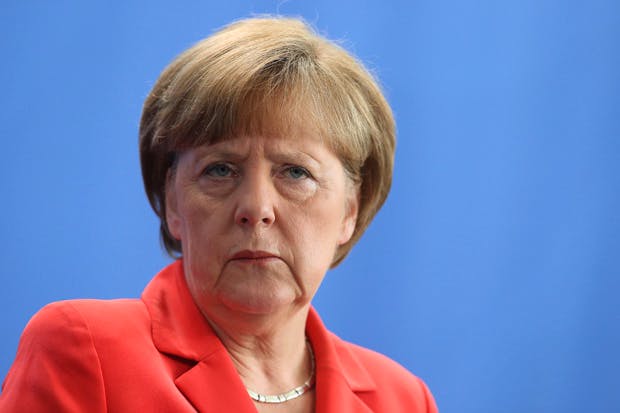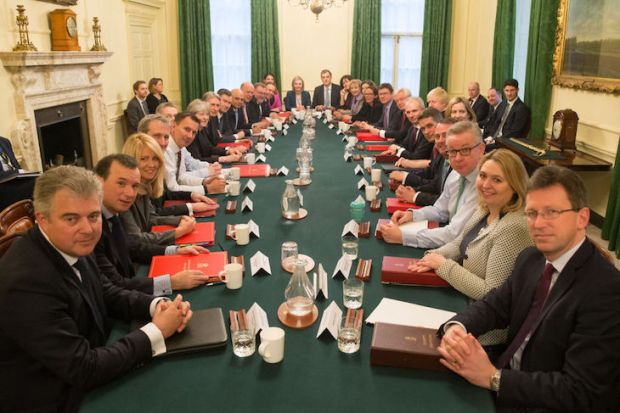Listen
http://rss.acast.com/viewfrom22/angelamerkel-sburden/media.mp3
For generations, ambitious politicians have dreamed about having the power to run Europe — but as Angela Merkel can attest, it’s a horrible job. She didn’t want to end up with the continent’s problems on her shoulders, but things have ended up that way. The Greek economic implosion, the seemingly unstoppable wave of immigrants from north Africa, the menace of Russian aggression, the euro crisis — all the multiple, interconnected, crises battering Europe have ended up as Merkel’s problem. The Queen will no doubt leave Germany this week thinking what every other leader in Europe does after a meeting with Frau Merkel: rather you than me.
The Queen’s visit has been conveniently scheduled for just before the European Council, at which Cameron will outline his renegotiation. Wednesday’s state banquet in Berlin has long been in Number 10’s diary as providing Cameron with a last-minute opportunity to lobby Merkel with no other EU leaders present. This was once envisaged as a major headache for Merkel; now, it looks like it will be the least of her problems.
The situation in the Mediterranean gets more desperate with each passing week. Some 100,000 migrants have arrived in Europe this year and there is no end in sight to the number who will head to the continent. Concern about them undermines confidence in the whole EU project — which Mrs Merkel seems to hold as dear to her heart as the fate of Germany. The EU leaders are doing more and have ordered their navies to start picking up these migrants. But by doing so, they are encouraging more people to take the risk of heading to sea in an attempt to reach Europe.
There is no sign of the pace of this movement of peoples slowing. In the next few years, unless something dramatic is done, millions will attempt to cross into Europe from north and central Africa. The countries at the receiving end of this great migration — Italy and Greece — are buckling under the pressure.
It is worth remembering that the crisis that Thursday’s European summit was meant to be addressing was the one prompted by Russian revanchism. Since annexing Crimea just over a year ago, Vladimir Putin has continued with his belligerent foreign policy. Russia continues to destabilise the Ukraine, menace the Baltic states and support those who can roil the western order.
These crises are all interlinked, as Merkel knows only too well. If Greece was jettisoned from the single currency, it could fall into Russia’s orbit. The migrant crisis is contributing to the rise of populist, anti-immigration parties across northern Europe, all of which have no interest in sending money south to bail out the more profligate eurozone states.
Merkel is an instinctively cautious politician. One of the ways in which she has accumulated so much political capital is simply by not spending very much. But it is almost impossible to see how she can come up with solutions to these problems that don’t cost her at home or abroad. Pick up the German tabloids and you soon see that it would be a brave, almost suicidal, politician who would send more money to Greece or offer to take in large numbers of Mediterranean migrants. But without Germany being prepared to shoulder more of the burden, the European project could fail.
Merkel, who grew up in communist East Germany, with all of its travel restrictions, is a fundamental believer in the principle of the freedom of movement. Under pressure from her, Cameron has dropped any challenge to it from his renegotiation. But in this era of mass migration it is hard to see how the principle can be sustained. The French have already reacted to the situation in the Mediterranean by reinstating controls on their border with Italy, despite both countries being part of the Schengen Agreement. Elections in Denmark last week gave the balance of power to the Danish People’s Party, which made clear during the campaign that it would not accept any attempt to disperse these Mediterranean migrants across the EU. But given how close Italy is to breaking point, as Nicholas Farrell detailed in last week’s Spectator, Rome desperately needs the EU to help.
If Europe won’t help, the Italian Prime Minister, Matteo Renzi, will follow through on the threat first made by Silvio Berlusconi and simply start issuing migrants with travel documents allowing them to go anywhere in the Schengen Area. One can easily imagine how Bild would react. The Schengen system could collapse very rapidly as governments across northern Europe scramble to fend off the populist challenge; it is worth remembering that there are elections in France and Germany in 2017. If Schengen went, the idea of free movement within Europe would be next.
Although some find the thought distasteful, Europe’s difficulty is Britain’s opportunity during this renegotiation. The measures that will have to be taken to address both the Greek crisis and the Mediterranean emergency offer the possibility of a very different EU — one in which Britain would be far more comfortable.
Yet Cameron is rushing to reach an agreement. He needs to hold the EU referendum before the end of 2017, but he wants everything wrapped up long before then; technical talks will start after this week’s summit. Given the seismic nature of what is happening in Europe right now, it is foolish to try to strike a deal so quickly. Time is on reform’s side and a better offer may well be available in a year’s time.
Another reason for slowing down is that the No campaign may well be a more formidable adversary than Downing Street had expected. The man co-ordinating the No side, Dominic Cummings — who ran the campaign against Britain joining the euro — has already floated the idea of committing to two referendums. The first vote would be on Cameron’s renegotiated deal and the second on the terms of Britain’s exit from the EU. Such an approach would make voting No in the first referendum feel far less risky.
Cameron has to secure a new form of EU membership for Britain. Then he must win the referendum and prevent the Tory party from splitting over the issue. Time might be an even more valuable ally to him in securing these objectives than Merkel.
Got something to add? Join the discussion and comment below.
Get 10 issues for just $10
Subscribe to The Spectator Australia today for the next 10 magazine issues, plus full online access, for just $10.















Comments
Don't miss out
Join the conversation with other Spectator Australia readers. Subscribe to leave a comment.
SUBSCRIBEAlready a subscriber? Log in